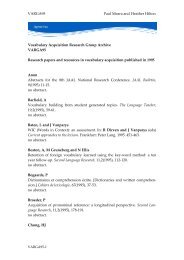A Note on Passive Vocabulary - Lognostics
A Note on Passive Vocabulary - Lognostics
A Note on Passive Vocabulary - Lognostics
You also want an ePaper? Increase the reach of your titles
YUMPU automatically turns print PDFs into web optimized ePapers that Google loves.
Meara 1990<br />
Figure 4:<br />
a hypothetical associati<strong>on</strong> network<br />
A<br />
L B<br />
K C<br />
J D<br />
I E<br />
H G<br />
life c<strong>on</strong>diti<strong>on</strong> known as Gille de la Tourette's syndrome (cf. van Lancker 1987). Patients<br />
suffering from this c<strong>on</strong>diti<strong>on</strong> have a limited expressive vocabulary, largely c<strong>on</strong>sisting of<br />
obscene words and curses. It would be interesting to know whether there are any<br />
recorded instances of L2 speakers with this syndrome, and whether it affects both the L1<br />
and the L2 in the same way.<br />
Finally, it might be worth adding a few words about how passive vocabulary becomes<br />
active. Traditi<strong>on</strong>al methods of teaching vocabulary rely very much <strong>on</strong> teaching single<br />
words, and providing active practice for words that are not well known. The sort of<br />
model I have outlined here suggests that this methodology might not be an efficient way<br />
of c<strong>on</strong>verting passive vocabulary into active vocabulary. <strong>Passive</strong> vocabulary may already<br />
have good links with the active parts of the network; merely supplying the word and<br />
asking for it to be used appropriately reinforces these already existing links, but does<br />
nothing to create the new inward-pointing links that an active word requires. This<br />
suggests that exercises which deliberately stress the associati<strong>on</strong> links leading from already<br />
known words to newly learned words might be a more effective way of activating a<br />
passive vocabulary.<br />
F<br />
4



